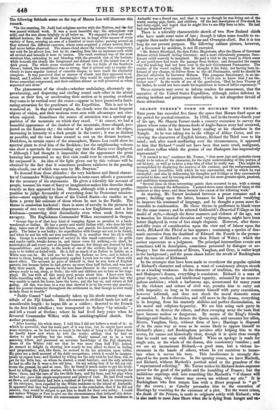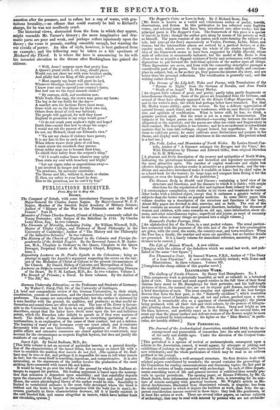SHARON TURNER'S POEM ON RICHARD THE THIRD.
This poem has exceeded five times the space that Horace fixed upon as the period for poetical retention. In 1792, and lathe twenty-fourth year of his age, Mr. Sharon Turner made a country excursion to survey the places where some of the famous deeds of Anglo-Saxon story had occurred, respecting which be had been lately reading at his chambers in the Temple. As he was taking tea in the village of Abbey Cerne, and re- viewing the characters of English history, Richard the Third rose to his mind ; and, after much meditating over the circumstances, it appeared to him that Richard "could not have been that mere cruel, malignant, and odious ruffian which the genius of our Shakspere has impressively represented." " It seemed to me," continues Mr. Turner, "that more just and probable views ought to be taken of his character, for the right understanding of this portion of our history, as well as to have a true idea of what he really was. This might be accomplished by displaying the motives of his conduct, and the embarrassments, dangers, and necessities with which he was surrounded, and by which he was entangled; and also by delineating his thoughts and feelings as they successively occurred to him; and by tracing and drawing out his more genuine spirit, passions, and ambitious temperament. "Several ideas on these interesting points then occurred to me, with a strong impulse to attempt the delineation. 1 penned down some sketches of these at the moment as they arose; and these became the GERM of the following work." At starting, Mr. Turner hesitated between a prose romance and a poem ; deciding upon the latter, because he had practised versifying to improve his command of language, and he thought a poem more fa- vourable to condensation. He chose rhyme in preference to blank verse for the same reason ; and he selected Goldsmith's Deserted Village as his model of style,—though the fierce manners and violence of the age, not 't aention its historical elevation and varying themes, might have been better displayed in verse of less simple elegance. However, after three- and-fifty years of consideration upon the view and of labour upon the work, Richard the Third at last appears ; containing a species of dra- matic narrative from the deathbed of Edward the Fourth to the prema- ture decease of Richard's own son then Prince of Wales which the author represents as a judgment. The principal intermediate events are sometimes told in description, sometimes presented by dialogue or so- liloquy: but the execution of Rivers, Vaughan, and Grey, is rather kept in the background ; and the poem closes before the revolt of Buckingham and the invasion of Richmond.
In the attempts that have been made to overthrow the popular opinion of Richard's character and crimes, a want of consistency always struck us as a leading weakness. In the character of tradition, the chronicles, and Shakspere's drama, everything is consistent. Richard is a man of great vigour, conduct, and intellectual capacity, animated by an unscru- pulous ambition ; which a barbarous age, accustomed for many years to the violence and crimes of civil war permits him to carry out with impunity, so long as he contents himself with party executions, however informal, and does not shock the moral domestic sense of mankind. In the chronicles, and still more in the drama, everything is in keeping, from his masterly abilities and perfect dissimulation, to his moral and religious hypocrisy. We see him using each party in succession to destroy the others, and then sweeping away the tools that have become useless or dangerous. By means of the King's friends Hastings and Stanley, he thrusts the Queen aside, and executes her allies, Rivers, Vaughan, Grey, without form of law; Hastings is disposed of in the same way as soon as he seems likely to oppose himself to Richard's plans ; and Buckingham perishes after helping him to the crown, for causes not historically clear, though it is quite clear enough that he could not cope with Richard. When an apology is made for single acts, or the whole of the drama, this consistency vanishes ; and we see an inconsistent Richard,—a good man, but a vicious in. strament in the hands of others, whom he yet contrives to immo- late when it serves his turn. This incoherence is strongly dis- played in the poem before us. In the opening scenes, we have Macbeth, not Richard, without Macbeth's poetical mind or the grandeur of the "supernatural soliciting." Mr. Turner makes his Richard desire supreme power for the good of the public and the humbling of France but the ambitions aspirings sink into something like Macbeth's "if chance will have me king, why chance may crown me without my stir." It is Buckingham who first tempts him with a direct proposal to " go " for the crown ; as Catesby persuades him to the execution of Hastings by vouching for the existence of a plot. Yet the worst crimes the death of the Princes, is made to originate solely with Richard; who is also made to meet Jane Shore when she Is dying from hunger and es* nanstion after the penance, and to refuse her a cup of water, with gra- tuitous bratality,-7an offence that could scarcely be laid to Richard's charge, for he was net needlessly cruel.
The historical views, abstracted from the form in which they appear, Might resemble Mr. Turner's history ; the more imaginative and dra- matic parts are poor and weak, and perhaps reflect injuriously upon the theory; the verse is prosaic, reading smoothly enough, but wanting the • vivida of poetry. An idea of style, however, is best gathered from an example ; and the following may be taken as a fair specimen of _Richard the Third. It is where the hero is announcing to his wife his intended elevation to the throne after Buckingham has gained the Citizens. "Well, Anne I suppose upon that pretty face A Queen's grand circle I, ere long; should place; Would you not cheer me with your loveliest smile, And gladly hail me King of this proud isle?"
"Most eagerly my heart will greet its lord, Whatever blessings should your life reward: I know your zeal to spread your country's fame; But how can we the regal summit claim?"
"By courage, skill, and resolution now, While feuds thus rage, the crown may grace my brow:
The oy is far too feeble for the day—
A manlier arm the factious Peers must sway.
Some wish me on the throne for their own end, Others from dread of civil war befriend; The people will applaud, for well they know England to greatness in my reign would grow."
"0 do not crash your nephew's right and hope f Guide him—assist him how to shape his scope: I would not rob the poorest of his due: Do not, my Richard, cloud our Edward's view."
" 'Tis not my choice if violence have power; It is my fate to live in such an hour: When others weave their plots of evil hue, I must arrest the mischiefs they pursue. Great nobles urge me to become their king, To shield their safety from the serpent's sting."
"0! I would rather brave whate'er may spite Than stain my soul with treachery and blight."
"Let not vague rules or superstitions sway—
I am involved m danger and dismay. 'Tis prudence, 'iris necessity constrains: The throne and life; without it, death or chains.
lf, then, my safety to your heart be dear, Base to the greatness, nor be cow'd by fear."



























 Previous page
Previous page